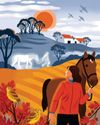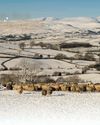Mobile masterclass
BBC Countryfile Magazine
|February 2022
You don't need a fancy camera to take stunning images of nature. Build up your skills with these 10 tips from Sussex photographer Mike Kus and you could take pictures worthy of the Countryfile Calendar

Magazines and books are full of beautiful landscape photographs that many of us could only dream of capturing ourselves, because we lack the technical knowledge and the camera equipment to achieve such impressive, professional results.
But is this really true? The short answer is ‘no'. Cameras don't take photos - people do. Ninety-nine per cent of what makes any photograph a success is you. It is the creative decisions you make that will have the greatest impact on the photographs you take, and not the equipment you use.
Which means that you don't need an expensive camera and you shouldn't be put off by a lack of technical knowledge. With a few simple tips and a bit of creativity, anyone can take beautiful photographs of their surroundings.
All you need is yourself and your phone, and you'll soon be submitting images to the Countryfile Calendar competition. countryfile.com/countryfile-tv-show/countryfile-calendar

1. LANDSCAPE COMPOSITION
It's the arrangement of objects and elements in a photograph that gives a picture a sense of depth and balance. To create a genuine sense of depth, we need to create a composition that has multiple layers: a foreground, mid-ground and background.
To achieve a sense of depth, try placing a foreground object - such as foliage, a fence or signpost – into your frame. This will help accentuate the distance between the foreground and background. Then use the mid-ground area of your picture to tie it all together and bring balance to the image.

2. FIND A NEW VANTAGE POINT
Esta historia es de la edición February 2022 de BBC Countryfile Magazine.
Suscríbete a Magzter GOLD para acceder a miles de historias premium seleccionadas y a más de 9000 revistas y periódicos.
¿Ya eres suscriptor? Iniciar sesión
MÁS HISTORIAS DE BBC Countryfile Magazine

BBC Countryfile Magazine
Manors and meadows
This December marks 250 years since Jane Austen's birth. To celebrate, Jack Watkins ambles around Chawton, where the writer penned novels that changed fiction forever
7 mins
December 2025

BBC Countryfile Magazine
TOP 10 ROYAL RESIDENCES
Castles, palaces and stately homes open a window into the history and private lives of the British monarchy
9 mins
December 2025

BBC Countryfile Magazine
Your countryside
HAVE YOUR SAY ON RURAL ISSUES
1 mins
December 2025

BBC Countryfile Magazine
Community spirit
Rural pubs across Britain are closing at an alarming rate - but local people are fighting back to save inns that have been at the hearts of their villages for centuries. Vivienne Crow orders a pint
4 mins
December 2025

BBC Countryfile Magazine
Gift ideas for nature lovers
Find inspirational and thoughtful presents for all the family in our pick of top outdoor gear and a round-up of this year's best nature and wildlife books
2 mins
December 2025

BBC Countryfile Magazine
Toad numbers are in freefall.It's in our power to save them
After becoming engaged at Christmas in 1998, my new fiancé and I were confronted by an enormous toad on the way to meet the vicar.
2 mins
December 2025

BBC Countryfile Magazine
Conquer fell running
Infamously tough yet famously friendly, the sport of fell running will take your fitness to new heights amid the wildest landscapes. Here's our beginners' guide
3 mins
December 2025

BBC Countryfile Magazine
A glorious haunting
They lived in the same village and shared the same dreams – just 60 years apart.
6 mins
December 2025

BBC Countryfile Magazine
The big questions answered
Across the UK, but particularly in the southeast of England, giant and featureless buildings are springing up.
13 mins
December 2025

BBC Countryfile Magazine
Away in a manger
While most of us down tools and pick up the mince pies, a farmer's work doesn't stop for the festive break.
5 mins
December 2025
Translate
Change font size

